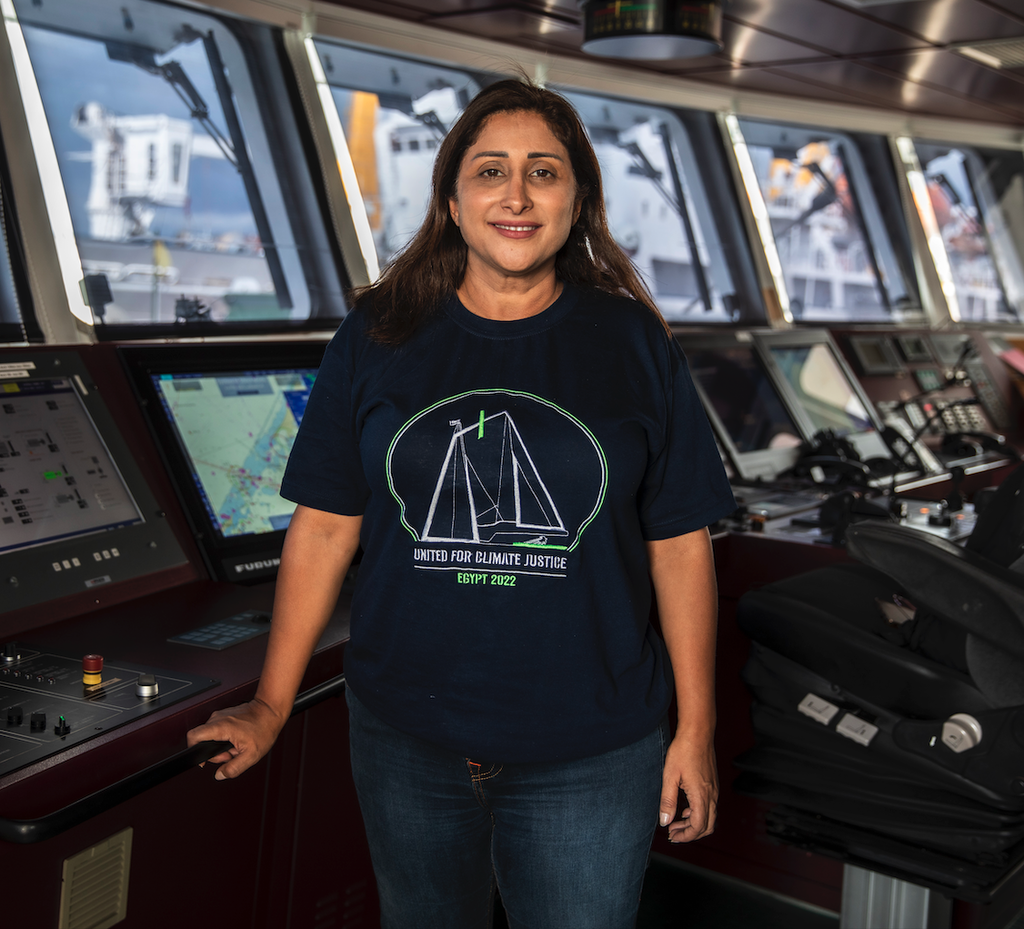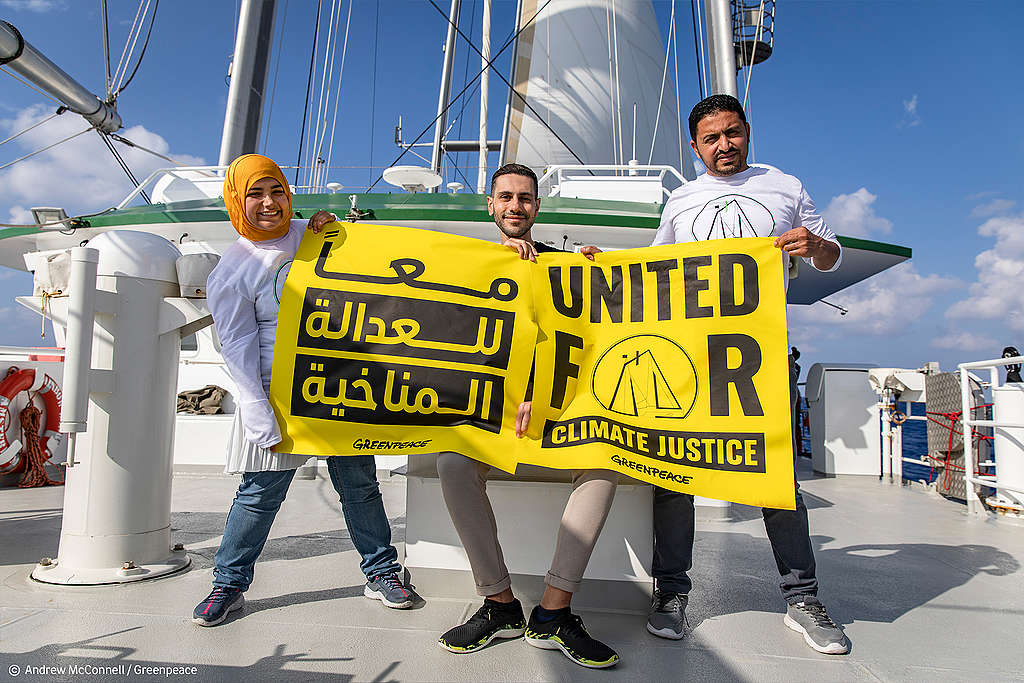
Ghiwa Nakat, Executive Director of Greenpeace MENA, is looking ahead to a UN summit that puts people first and addresses the realities of climate injustice.
When climate disaster is having a disproportionately large impact on the poorer communities of the Global South, a United Nations Climate Change Conference on the frontlines of the crisis is an unmissable opportunity to shift the narrative.
More commonly referred to as the COP, the event is being held this year beside the Red Sea in Sharm el Sheikh in, Egypt and it will be a chance to spotlight the people and communities of the Middle East, Africa and the wider Global South. Many of these countries are among the most vulnerable to climate impact, suffering drought, famine, and soaring temperatures as well as desertification and rising sea levels.
COP27 is our focus for creating a shift in mindset to embrace the need for systemic change to secure a better alternative future for the people of the MENA region. We are calling for accountability that recognises the liability of rich countries and historic emitters, the most responsible for climate change, for the loss and damage caused to poorer countries. This is what we call climate justice.
‘Loss and damage’ is a term used in UN climate negotiations and normally refers to the destructive impacts of climate change that cannot be avoided either by mitigation (avoiding and reducing greenhouse gas emissions) or adaptation (adjusting to current and future climate change impacts). Loss and damage includes that which has already been suffered and that which will inevitably happen.
The catastrophic Pakistan floods and the drought in the Horn of Africa are examples of the catastrophic disasters that must be addressed immediately, and they underline why it is essential to reach a deal to tackle the loss and damage faced by vulnerable climate frontline nations. Loss and damage financing is urgently needed to ensure that these vulnerable communities are able to rapidly respond to climate disaster and recover. Without this support, individuals and communities can so easily spiral into poverty as they are hit by loss of livelihoods, food insecurity, as well as related physical and mental health impacts.
The latest estimates suggest that at least 3.3 billion people live in circumstances that are highly vulnerable to climate change and studies show the economic cost of loss and damage caused by climate disaster in developing countries could reach $580 billion by 2030. This huge figure is still insignificant compared to the cost of non-economic or intangible forms of loss and damage such as lost lives and impacts on health, education, well-being, culture and traditions, as well as the loss of biodiversity and damage to ecosystems.
Greenpeace’s big ask at this year’s COP is for the establishment of a dedicated system of climate finance funded by the historic emitters and polluters that would compensate vulnerable communities for this ‘loss and damage’, as well as further current and future harm, and help a fair and just transition towards a resilient and safe future powered by renewable energies.
Greenpeace has met many frontline communities proactively engaged in adapting to climate change and finding solutions – often they are the poorer communities with the fewest resources. We met Egyptians preserving their traditional villages by the solarisation of their electricity; farmers in Algeria learning new techniques to reduce the encroachment of sand and desertification; Lebanese botanists building the resilience of ancient cedar forests to growing temperatures; Egyptian marine biologists gaining insight into Red Sea corals so they can build the resilience of dying reefs elsewhere. They offer us the hope that, with help, people can successfully lessen the impact of climate disaster, however these heroic efforts are often undermined by overlapping crises and a system that prioritises profit over people and the planet. For centuries, this system has been rooted in racism, patriarchy, extractivism, consumerism, exploitation, and disempowerment. Rich countries have squeezed huge profits out of the fossil fuel economy while setting the globe on a path of dependence on fossil fuels.
Finance for adaptation is important but often not enough to protect these communities from climate-driven disasters nor recover from their tragic losses, hence the need for a Loss and Damage Finance Facility.
Hope isn’t always easy to find – especially among those communities which are sadly facing increasingly uninhabitable environments: disappearing oases in Morocco threaten an end to a traditional way of life; failing harvests in the Nile Delta jeopardise the livelihoods of Egyptian farmers; in Tunisia beekeepers and shepherds alike are struggling to find enough vegetation, while olive growers can no longer find water for their trees; rising sea levels threaten the existence of important Algerian archaeological sites.
This is why we need to address the past and COP27 is a chance to give adequate recognition and funding for ‘Loss and Damage’ finance, which would hold rich countries accountable for a past that has left other countries poorer and more vulnerable to the climate emergency and for a future that risks seeing these same communities plagued by inevitable climate impacts beyond their capacities to mitigate and adapt.
Substantial levels of climate finance provided on an annual basis to marginalised and exposed communities would compensate them for their loss and damage. Governments must target financial support at these communities, and they must also tackle the underlying problems of poverty and inequality that make poor communities and poor countries more vulnerable to both climate shocks and slow-onset changes to the climate.
For all these reasons, Greenpeace’s main ask at COP27 is for the creation of a new Loss and Damage Finance Facility. We will be calling on countries to provide the necessary technical support to make sure the funds get to the people who need them; the richer, polluting countries should contribute additional funds for the facility, building on the commitments already made by Denmark, Scotland and Wallonia; and there should be agreement that loss and damage finance be a third pillar, alongside – but separate from – mitigation and adaptation. A separate pillar is crucial to ensure balanced provision for these issues and that finance is not taken from one to fulfil commitments to the other.
The climate crisis is putting our future generations at risk. With about 60% of our population under 25 years old, our region is one of the most youthful in the world. Now is the time to ensure their voices – and all other voices from the Global South – are heard at COP27. The global youth climate movement has become more representative of southern communities, and young campaigners will be arriving in Sharm el Sheikh in the middle of COP to voice their determination to promote sustainable change. More and more of these young people are already involved in climate action on the ground and leading local community initiatives – with their talent and interest the future looks greener.

